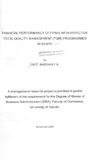Financial performance of firms with effective total quality management (TOM) programmes in Kenya
| dc.contributor.author | Omiti, Margaret K | |
| dc.date.accessioned | 2013-05-15T08:51:56Z | |
| dc.date.available | 2013-05-15T08:51:56Z | |
| dc.date.issued | 2003-11 | |
| dc.identifier.citation | Masters in Business Administration, University of Nairobi (2003) | en |
| dc.identifier.uri | http://erepository.uonbi.ac.ke:8080/xmlui/handle/123456789/23042 | |
| dc.description.abstract | This study explores the hypothesis that implementing effective TOM programmes improves the operating performance of firms. ISO Certification is used as a proxy for the effective implementation of TOM programmes. Means of various performance measures for an experimental group of ISO certified firms are compared against a sample of control firms. The statistical tests provide evidence that firms with effective TOM programmes show significant improvement in performance as compared to the control firms on operating income based measures and sales based measures. The return on total assets employed for the experimental group improved from 4.79% to 8.06% in the two five-year periods of before and after TOM implementation respectively. For the control group the mean return on total assets employed decreased from 7.80% to 1.23% in the same period. The difference in performance was statistically significant after TOM implementation. Similarly the five-year mean return on equity for the experimental group improved from 9.38% to 18.28% in the period before and after TOM implementation respectively. Over the same period the control firms' return on equity decreased from19.2% to 10%. The difference in performance was statistically significant. The mean performance change in sales for the experimental group dropped from 40.61% to 6.62% over the period before and after TOM implementation. That of the control group dropped from 13.12% to (negative) -0.85% over the period before and after TOM implementation respectively. However .the difference was statistically insignificant. Similarly, the mean of the percentage change in net income for the experimental group decreased marginally from 16.74% to 11.90% for the period before and after TOM implementation while that of the control group decreased significantly from 38.42% to (negative) -41.68%. However the difference in performance was tested and found to be insignificant. | en |
| dc.language.iso | en | en |
| dc.publisher | University of Nairobi. | en |
| dc.title | Financial performance of firms with effective total quality management (TOM) programmes in Kenya | en |
| dc.type | Thesis | en |
| local.publisher | Faculty of Commerce | en |

